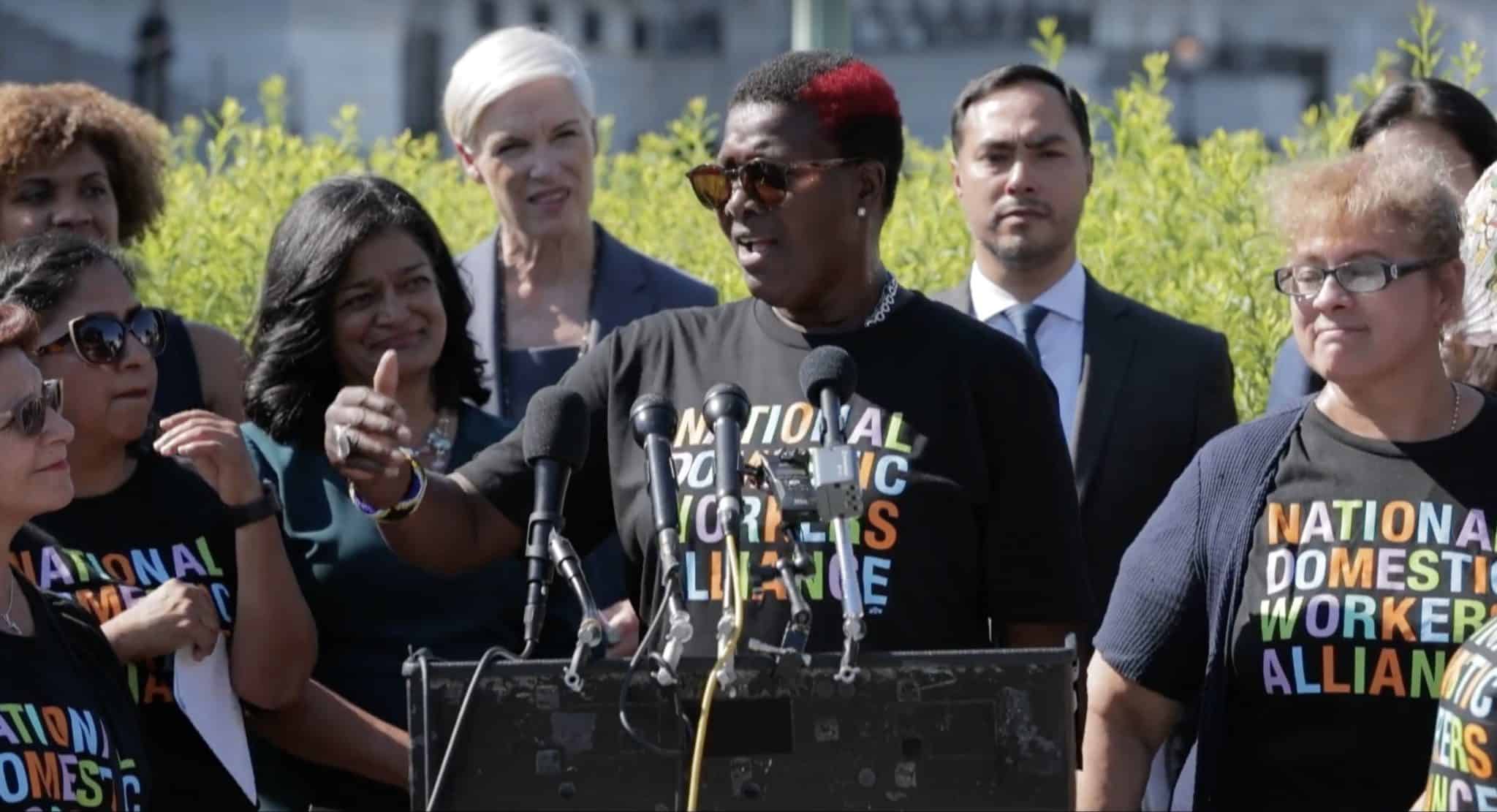
Sharon Block is a Professor of Practice and the Executive Director of the Center for Labor and a Just Economy at Harvard Law School.
This week, Senator Kamala Harris and Representative Pramila Jayapal introduced the National Domestic Workers Bill of Rights (HR 3760 and S 2112). The bill provides a number of important protections for domestic workers. The bill corrects several historical exclusions of domestic workers from the nation’s social safety net – ensuring that domestic workers are covered by the overtime pay provisions of the Fair Labor Standards Act and requiring the Department of Labor to study how to include domestic workers in state workers compensation systems. It also proposes that domestic workers be covered by the Healthy Families Act in the same way as other covered workers, when that bill is enacted. Finally, it would eliminate the small business exclusion in Title VII to ensure protection from discrimination for domestic workers, who often work alone in their workplaces.
What I find most interesting about this new legislation, however, is that outside of the areas noted above, it uses a sectoral approach to setting labor standards. It would legislate a number of standards that address the particular challenges of domestic work. For example, the bill chips away at employment-at-will by requiring notice of termination and severance pay for live-in domestic workers, recognizing the hardship that comes from losing one’s home at the same time as losing a job. In recognition of the rampant wage theft that plagues the sector, the bill also would require written employment agreements for any domestic workers employed for more than eight hours a week. Finally, the bill requires access to phone and internet service and special privacy protections for live-in domestic workers.
To set wages and other terms and conditions of employment, the bill creates a Domestic Worker Wage and Standards Board. The Board would comprise an equal number of members representing domestic workers and hirers of domestic workers. The worker members must be nominated by organizations that represent domestic workers. The hiring entities’ members must include at least two members who employ domestic workers in their homes, one member who employs at least two domestic workers, one member who relies on a Medicaid funded domestic worker and one family caregiver. The Secretary of Labor also would serve on the Board. The Board would make recommendations on wages and standards to the Secretary, who would be required to (1) implement the recommendations through regulation where possible; (2) recommend implementing legislation where regulations were not authorized by existing DOL authority; or (3) report to Congress outlining why she or he did not adopt the Board’s recommendations.
This bill is an example of how labor law reform could move in the direction of sectoral bargaining. Firm level bargaining has never been a promising approach for the domestic work sector. As mentioned above, many domestic workers work alone in their workplaces. Setting standards workplace by workplace where domestic workers are hired by the families they serve would be impossible. In addition, many domestic workers work for multiple employers, again making a system based on workplace by workplace standards complex. For these reasons, expansion of the National Labor Relations Act to cover domestic workers (who are currently excluded) would be an imperfect reform.
As Ben and I previewed in our Labor Day post last year, one central tenet of our Clean Slate Project to reimagine labor law is the importance of exploring how to incorporate sectoral bargaining into our system of labor relations. The Wage and Standards Board system created by the National Domestic Workers Bill of Rights would be an important advance in giving domestic workers a meaningful voice in their industry, where they currently have none. It would achieve the principal virtue of sectoral bargaining – precluding competition for customers on the basis of providing lower cost labor.
Although the Board represents a sectoral approach to labor standards, it is not exactly collective bargaining. The parties sitting at the table negotiating are not necessarily there as a function of the strength of their representative status in the sector. In addition, because of the role of the Secretary of Labor, the outcome of the Board’s negotiations would remain vulnerable to the vicissitudes of changing political winds and not necessarily be determined by the parties’ relative bargaining power.
There are a couple of tweaks, however, that could make the system created by the bill more like true sectoral collective bargaining. First, the workers’ seats on the board could be allocated to the worker organizations that represent the most domestic workers. This kind of allocation would encourage organizing among domestic workers and aggregate the power that they could exercise on the Board. Second, the bill could explicitly protect domestic workers’ right to engage in concerted activity. Because they aren’t covered by the NLRA, domestic workers do not have protection from being fired if they strike, picket or otherwise act collectively. This right would be critical to giving workers the ability to use their collective power to influence the outcome of the Board’s negotiations.
Even without these tweaks, the National Domestic Workers Bill of Rights is an important advance for two conversations we need to have about the future of workers’ rights: (1) how to raise standards for domestic workers, who are some of the most undervalued and vulnerable workers in our country and (2) how can innovative legislative approaches make sectoral bargaining a part of our overall labor law system.










Daily News & Commentary
Start your day with our roundup of the latest labor developments. See all
February 15
The Office of Personnel Management directs federal agencies to terminate their collective bargaining agreements, and Indian farmworkers engage in a one-day strike to protest a trade deal with the United States.
February 13
Sex workers in Nevada fight to become the nation’s first to unionize; industry groups push NLRB to establish a more business-friendly test for independent contractor status; and UFCW launches an anti-AI price setting in grocery store campaign.
February 12
Teamsters sue UPS over buyout program; flight attendants and pilots call for leadership change at American Airlines; and Argentina considers major labor reforms despite forceful opposition.
February 11
Hollywood begins negotiations for a new labor agreement with writers and actors; the EEOC launches an investigation into Nike’s DEI programs and potential discrimination against white workers; and Mayor Mamdani circulates a memo regarding the city’s Economic Development Corporation.
February 10
San Francisco teachers walk out; NLRB reverses course on SpaceX; NYC nurses secure tentative agreements.
February 9
FTC argues DEI is anticompetitive collusion, Supreme Court may decide scope of exception to forced arbitration, NJ pauses ABC test rule.